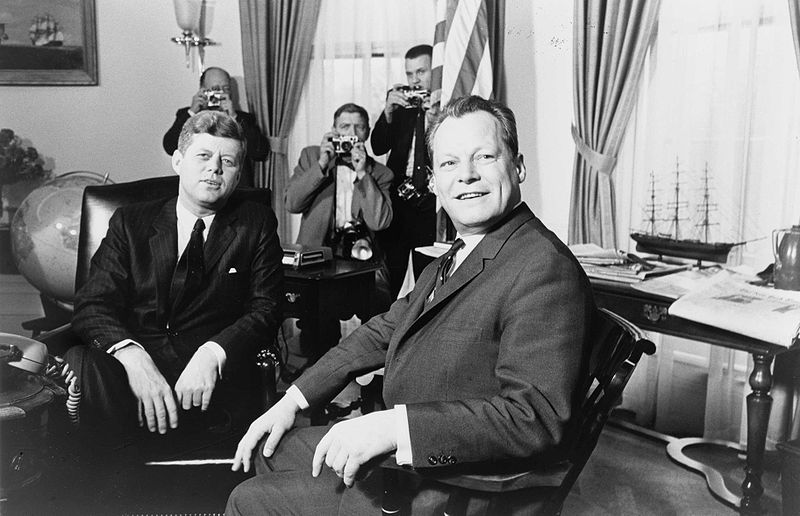
President Kennedy was enraged.
He considered the letter from Mayor Willy Brandt that had landed on his desk that morning, three days after the Berlin border closure, to be insulting and impertinent. Even given the gravity of Berlin’s crisis, it overstepped the sort of language any city mayor should use with the American president. With each line that he read, Kennedy grew more certain that the letter’s primary purpose was to serve Brandt’s campaign against West German Chancellor Konrad Adenauer for national elections a month later.
Worse yet, Brandt had revealed the contents of the ostensibly confidential letter that day to a rally outside his city hall with more than 250,000 West Berliners, who had grown as angry at the Americans about their role in condoning the border closing operation as they were with the East Germans and their Soviet minders for conducting it. West Germany’s most-read newspaper, Bild-Zeitung, with its circulation of 3.7 million, had covered the entire top half of its front page with a headline that captured the public mood: THE EAST ACTS – AND THE WEST? THE WEST DOES NOTHING.
In the letter, Brandt called the Communist encroachment “the most serious in the postwar history of this city since the (1948) blockade.” In a surprisingly direct rebuke of Kennedy’s acquiescence, he wrote, “While in the past Allied Commandants have even protested against parades by the so-called National People’s Army in East Berlin, this time, after military occupation of the East Sector by the People’s Army, they have limited themselves to delayed and not very vigorous steps.”
He charged that the Allies, and thus Kennedy, had thus endorsed the “illegal sovereignty of the East Berlin government.” Brandt protested, “We now have a state of accomplished extortion.”
Brandt warned Kennedy that West Berlin could become “like a ghetto” and that, instead of suffering a flood of East German refugees westward, the city might soon experience the beginning of the flight from West Berlin of citizens who were losing confidence in the city’s future.
Brandt’s letter then set out a series of proposals, writing more in the voice of a national leader than a city mayor. He called upon Kennedy to introduce a new, three-power status for West Berlin that would exclude the Soviets but include the French and British. He wanted Kennedy to bring the Berlin question before the United Nations, as the Soviet Union “has violated the Declaration of Human Rights in most flagrant manner.” Finally, he said, “It would be welcomed if the American garrison were to be demonstratively strengthened.”
Brandt closed with the line, “I consider the situation serious enough, Mr. President, to write to you in all frankness as is possible only between friends who trust each other completely.” Then he signed it, “Your Willy Brandt.”
Kennedy fumed. The letter was political dynamite. “Trust?” Kennedy spat as he angrily waved the letter at his press secretary, Pierre Salinger. “I don’t trust this man at all. He’s in the middle of a campaign against old Adenauer and wants to drag me in. Where does he get off calling me a friend!”
For all his outrage, however, Kennedy wrote back Brandt two days later that he planned to dispatch to Berlin both Vice President Lyndon Johnson and General Lucius Clay, the hero of the Berlin Airlift of 1948, to buck up Berliner spirits. He would also take Brandt’s advice that he send troop reinforcements to Berlin, though his letter would make clear this was his own decision after “careful consideration” and not a result of Brandt’s letter.
However, he rejected Brandt’s other suggestions. His logic was that the Soviet action was too serious for an inadequate response, and thus any action short of war fell short, and he wouldn’t go to war. Thus, he told Brandt, he had objected to all the remedies he had heard thus far, including “most of the suggestions in your own letter.”
Though Brandt would later take credit for Kennedy shifting to a more active defense of Berlin, perhaps more decisive were the words of his friend Marguerite Higgins, a well-known U.S. war reporter, when he showed her the Brandt letter in disgust. “Mr. President, I must tell you quite openly,” she said, “that in Berlin the suspicion is growing that you want to sell out the West Berliners.”
Fred Kempe is president and CEO of the Atlantic Council. His latest book, Berlin 1961, was published May 10. This blog series originally published by Reuters.
Image: jfk-willie-brandt.jpg
